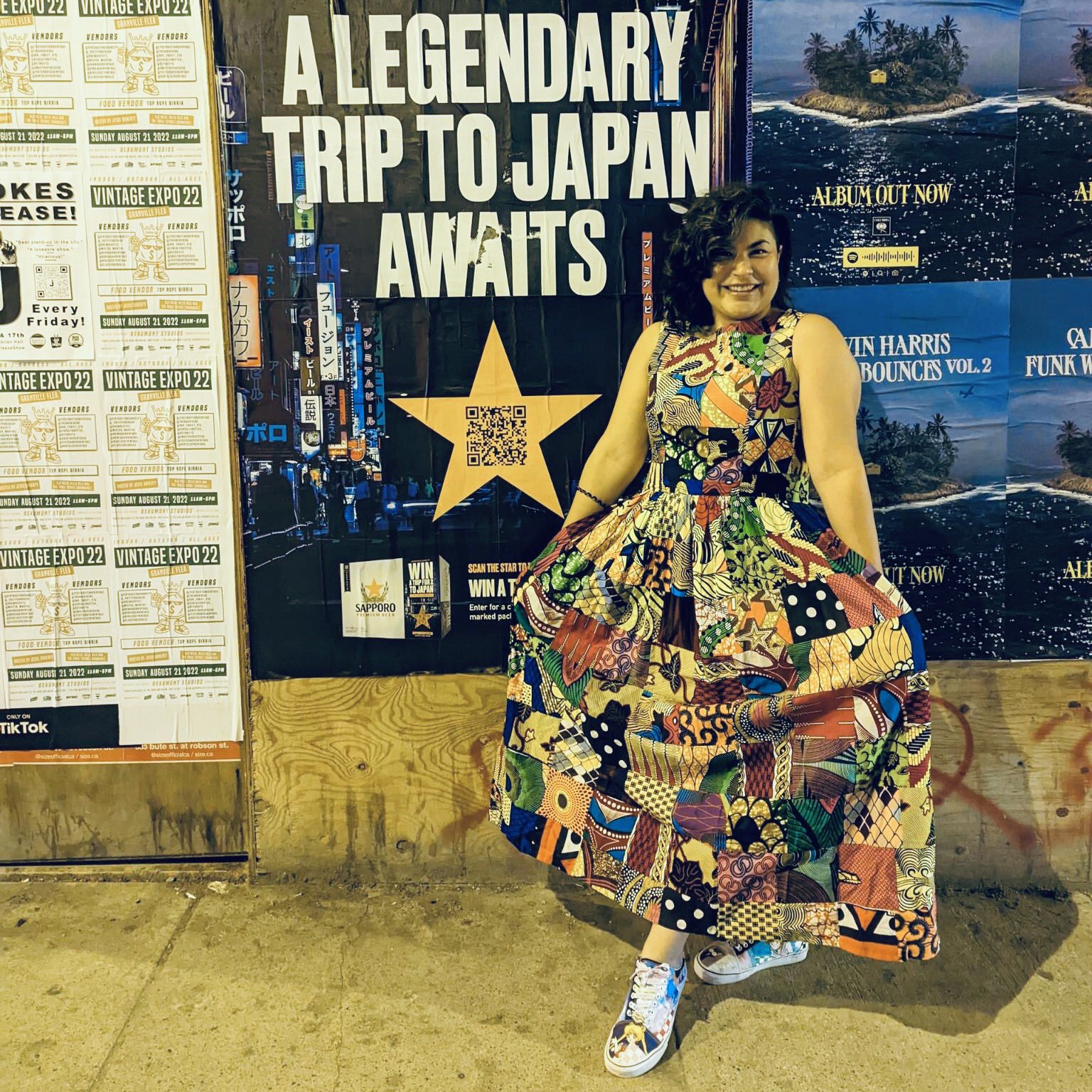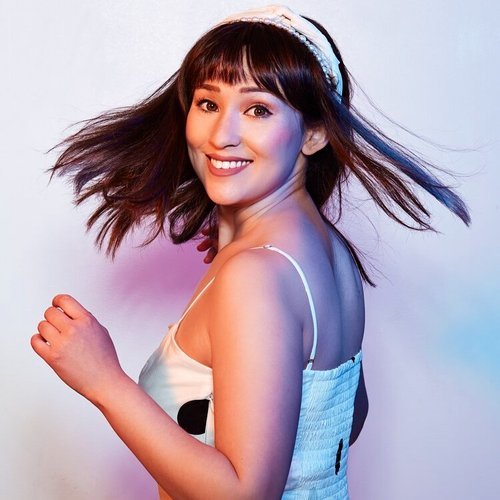Carmel Tanaka: JEWPANESE Trailblazer for the Mixed Asian Future
Mixed Asian Media - November 11, 2022
By Stephanie Mieko Cohen
Photo Courtesy of Carmel Tanaka
Carmel Tanaka is a Japanese Canadian, Jewish, queer woman who is paving the path for mixed race individuals all over the world. While she wears many different hats, her newest project, the JEWPANESE Oral History Project, focuses on sharing stories and archiving memories of Jewish and Japanese people. I met with Carmel on Zoom, and we talked for over two hours! Here is just a bit of our conversation.
Interview
Photo Courtesy of Carmel Tanaka
Hi, Carmel! Talk to me about your very extensive career. Based on what I know about you, you’re a true overachiever!
Growing up, I didn’t know the direction of my career. It’s been quite eclectic, and I guess it’s all been for a reason. All of my experiences have brought me to where I am today. There’s a new title people are giving me, which I’m now only starting to embrace: documentary filmmaker. I didn’t go to art school or any of that. I guess I’m learning as I go and adopting more titles! I had to learn a lot of new skills over the pandemic, and I feel very grateful I was able to learn them to stay connected.
Tell me about some of the organizations you run.
One is JQT Vancouver (@jqtvan), a volunteer-run Jewish, queer, and trans nonprofit. We are the only homegrown Jewish LGBTQ2SIA+ nonprofit in Canada. I figured that out because the demand during the pandemic was so intense for the Jewish-Canadian LGBTQ2SIA+ community, and all of a sudden the views on all our content skyrocketed. We went from little meetups of 10-15 people for Shabbat to, like, hundreds of people tuning in. It shows a dire need for support. We just did a community needs assessment, and it was very illuminating. Vancouver has a very conservative Jewish community. We’re making changes locally on how to become more inclusive. I also founded the Cross Cultural Walking Tours (@crossculturaltours). It brings awareness of the contributions of Indigenous and early immigrant communities to Vancouver in celebration of Asian and Jewish Heritage Months in May. It’s an educational grassroots program that dives into the systemic oppression, racism, displacement, and impact of urban renewal experienced by many marginalized communities THEN and NOW — sharing history and stories together in one tour.
What is your ethnicity? Are you more connected to one side of your heritage over the other?
I’m Japanese Canadian, I’m Jewish Israeli Ashkenazi, and I’m queer. I do not want to have a single one of those identities left at the door. I wanna celebrate all of who I am. I’m just unapologetically me now.
My mom is Israeli. She met my father on a student exchange program in Jerusalem, both architectural students. This was in the ‘70s, and they fell in love. I didn’t meet a lot of other multiracial folks growing up. I was pretty much an anomaly in Vancouver. Now things have changed — there’s been a lot of immigration to the city. While I grew up Jewish in many ways, I didn’t grow up at all connected to the Japanese Canadian community. My dad is a descendant of interned Japanese Canadians. The community’s reaction to the internment resulted in a loss of language, culture, and identity. So, growing up, my dad never talked about the internment. I’ve never been to Japan, and my dad has never been to Japan either. The only thing that was really Japanese that I knew about was food. We would go to Fujiya, which is our local Japanese grocery store. We’d pick up all the ingredients and make food for New Year’s. And at the time there was a VHS section where you could rent copies of Sailor Moon!
Oh my gosh, I love Sailor Moon! Also, I had the opportunity to go to Japan with my family in November 2019. You absolutely need to go!
I was really hoping to go to Japan for this project and interview Jewpanese families there. It’s very infuriating, this COVID thing. Right now, Japan is technically open to foreigners, but only on organized tours. I think it’ll have to be next year.
What is the JEWPANESE Oral History Project?
When finding out that you’re Jewish and Japanese, people always want to know why you look the way you do and how your parents met. There’s this fascination. And when you tell them, they’re like, “Oh wow, your parents couldn’t be more different.” That’s very interesting because what I see is: obsessed foodies, sticklers of tradition, emphasis on education. Right? I see the similarities more than I see the differences. I proposed to do 20 oral video interviews in four countries: Canada, the U.S., Japan, and Israel for this fellowship program and was selected as one of its five fellows! It’s been a very busy few months. This project is helping me process and digest my early childhood, which is why I’m probably doing this in the first place. This is my therapy. [While I’m doing Zoom interviews,] I think people feel much more comfortable if we do the interview in person. I want to go into your homes. I want to see how you decorate your home. Where is the Judaica? Where is the Japanese art? I want to know how you eat. I want to know how you make your food. Do you fuse cultural ingredients together or keep them separate? How does that reflect in your life as well? When you’re in Japanese company, are you, like, “full-on Asian?” Do you leave your Jewish identity behind or vice versa? Do Jewpanese people identify as white or people of colour? There is a very wide spectrum of answers. This is a complicated question for those who are mixed, but also for Jews in general. I want to show that we’re not all one. We are not a homogeneous group. We have a lot of diversity in our lived experiences.
You mentioned you lived in Israel for a few years. What was it like living there as a mixed race person?
I was there for a few years on and off. I did one year as an undergrad at Tel Aviv University and came back to Canada, then kept going back and forth. I was like, “Why am I going back and forth? Why don’t I just move?” So I ended up making Aliyah as a returning citizen, because I was already an Israeli. I did my master’s degree in emergency and disaster management at Tel Aviv University and lived there for a few more years after that. Yeah, living in Israel is weird, in some of the most beautiful ways and some of the most horrible ways. It’s very much a land of extremes. Eat or be eaten. But as a mixed race person, I never felt out of place because everyone else is mixed there, and being Jewish is not what singles you out there like it does here in North America, which was a welcomed relief.
Did you ever face racism and/or antisemitism there, or have you in Canada?
When I was in Grade 4, I came home to a piece of paper hanging on our front gate, with a caricature drawing of me surrounded by swastikas. This is not something children should know how to draw. Clearly they were taught. Fast forward to today, the form of antisemitism I experience now most often is found in the progressive left circles I run in and make it notoriously difficult to navigate.
The microaggressions I dealt with in the Jewish community were not pretty either. My favorite one:
“What’s your name?”
“Carmel.”
“So, how’d you get this name?”
“My Mother. She named me after Mount Carmel in Israel.”
“Oh, so you’re Jewish?”
You have to go through this dance with them. It’s such an awful experience, but I became fluent in this dance. I was very good at it too. I knew all the steps and sometimes would screw it up on purpose.
Oh absolutely. It’s a dance we all know very well. I love when people ask, “Where are you from?” and I say, “California.” They go, “No, where are you REALLY from?” and I say, “California.” I know what response they want, and I don’t give it to them. I’m a little sassy about it sometimes.
Okay last question, what are your hopes moving forward with the JEWPANESE Oral History Project?
This project is fulfilling all of my dreams beyond way more than I could have ever imagined. I get to meet Jewpanese people, like you and Alex. Since May 2020, we’ve been hosting a monthly Zoom call with Jewpanese people, couples, and families to discuss anything from “How are you raising your kids?” to “What cultural medicines do you practice?” to “What are your favourite Jewpanese recipes?” I’m also organizing social events in each of the towns that I visit to do interviews, a catalyst to initiate community building of Jewpanese people. So many of my interviewees say I’m their first Jewpanese person they’ve met, aside from their siblings. Well, I’m certainly not gonna be their last.
End of Interview
Stephanie Mieko Cohen is a Los Angeles native who made her way to New York City. She is Yonsei, and a proud member of the NYC MAM Fam! Performing since the age of 5, Stephanie has appeared on Broadway, national tours, regional theatre, television, film, and in the voiceover world. She is a certified Vinyasa yoga instructor and dvocate for mental health awareness, equality, and spreading kindness. In her spare time, Stephanie enjoys crafting, writing, eating as much Mexican food as she can, reality television, and playing with kitty cats. Follow her on Instagram @stecohen and online at www.stephaniemiekocohen.com.





